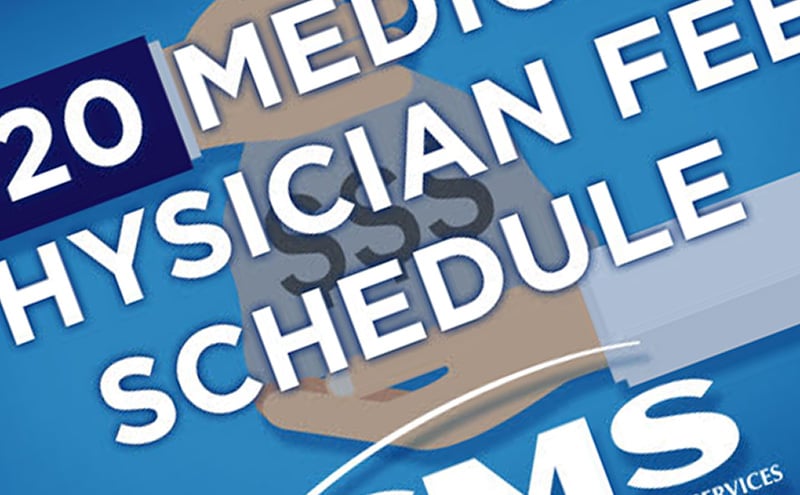Earlier this week, ACEP submitted a letter to the Centers for Medicare & Medicaid Services (CMS), responding to their proposed 2020 Medicare Physician Fee Schedule—which was released in July. This is a major reg that affects Medicare physician payments and the Merit-based Incentive Payment System (MIPS).
As this is just a proposed reg, CMS is collecting comments from external stakeholders and uses that feedback to help inform the final policies. You can read a summary of ACEP’s comments here and the full 42-page response here—but here are the key highlights of our response:
- Billing codes describing the five levels of ED visits: CMS previously identified the five codes mostly commonly billed by emergency physicians as potentially mis-valued. Based on survey data collected by ACEP from practicing emergency physicians , CMS is now proposing an increase in the value of the ED Evaluation and Management (E/M) codes in 2020 to better account for the intensity of these services—potentially a large financial impact. However, for 2021, CMS is proposing an increase to the other office and outpatient E/M services, which could lower the eventual payments to ED E/M codes because of required budget neutrality in Medicare.
ACEP Response: ACEP is aware of the significant budget neutrality adjustment that would be triggered if CMS finalized all of the proposals as proposed in calendar year (CY) 2021. Given our concerns with the potential effect of the proposed increases in office and outpatient E/M codes, we offer the following two solutions:
- Increase the value of the ED E/M codes, levels 1 through 3, to align with the corresponding levels for the office and
outpatient E/M codes for new patients; and
- Delay the implementation of the add-on code for complexity. - Reducing documentation burden: CMS proposes to eliminate duplicative documentation requirements in medical record—a potential time and money savings.
ACEP Response: ACEP believes that this broad flexibility will significantly reduce burden for teaching physicians and urges CMS to finalize this proposal. - Adding a new benefit for Opioid Use Disorder Coverage: New benefits will be added for treatment services delivered by an opioid treatment program for allowing providers to dispense certain drugs, and to provide counseling and therapy and toxicology testing. CMS is also proposing to establish bundled payments for the overall treatment of opioid use disorder and is seeking comment on possibly reimbursing medication-assisted treatment (MAT) in the ED.
ACEP Response: ACEP is extremely supportive of a future policy that would pay separately for MAT initiated in the ED and strongly encourages CMS to include such a proposal in next year’s rule. - Seeking comment on a new framework for the Merit-based Incentive Payment System (MIPS) called the MIPS Value Pathways (MVPs): CMS believes that MVPs would reduce the burden of reporting for physicians and also link elements of the program together into one cohesive function. CMS aims to start transitioning clinicians into MVPs in 2021.
ACEP Response: ACEP is encouraged by the proposed introduction of the MVP framework in the rule. However, we are generally concerned about the implementation timeline CMS is proposing and strongly recommend that CMS allow an additional year or two for the agency to continue to flesh out the details, receive additional public input, and propose and develop the first cohort of MVPs. - Increasing the performance threshold under the MIPS program (the threshold that a clinician must exceed to be eligible for a payment bonus): CMS is proposing to increase the threshold from 30 points in 2019 to 45 points in 2020, and 60 points in 2021.
ACEP Response: ACEP believes that the proposal represents a reasonable increase in the performance threshold over the next two years. - Increasing the additional performance threshold to reward exceptional providers: CMS has an additional bonus an additional to their regular performance threshold. The threshold for this additional bonus increases from 75 points in 2019 to 80 points in 2020 and 85 points in 2021.
ACEP Response: ACEP believes the additional performance threshold should be kept at 80 points for both 2020 and 2021. - Increasing data completeness requirements for quality performance: CMS is proposing to increase the percentage of data required to be submitted from 60 percent in 2019 to 70 percent in 2020.
ACEP Response: ACEP does not support the proposed increase in the data completeness threshold to 70 percent. We believe that the current threshold of 60 percent is appropriate. - Changing the definition of “hospital-based” for groups to be eligible for hardship exemptions for the Promoting Interoperability (EHR) category of MIPS: Currently, clinicians who are considered “hospital-based” as individuals are exempt from the Promoting Interoperability category of MIPS. However, if individual clinicians decide to report as part of a group, they lose the exemption status if even a single group member does not meet the definition of “hospital-based.” ACEP has repeatedly argued that this is unfair as it penalizes hospital-based clinicians who work in multi-specialty groups. CMS is proposing to modify this policy by exempting groups from the Promoting Interoperability category of MIPS as long as 75 percent of individuals in the group meet the definition of hospital-based.
ACEP Response: This is a major win for ACEP. We are extremely appreciative that CMS is proposing to modify this policy in the rule and we strongly urge CMS to finalize this proposal. - Adding new Qualified Clinical Data Registries (QCDR) requirements: CMS proposes numerous new requirements for both 2020 and 2021 for QCDRs which will have a direct impact on ACEP’s own QCDR, the Clinical Emergency Data Registry.
ACEP Response: ACEP responds to each individual QCDR proposal directly. In general, we are concerned that some of the proposals may make it more difficult and burdensome for QCDRs to participate in MIPS successfully. - Alternative Payment Model (APM) QPP track, adding other-payer medical homes, and technical changes: CMS is proposing technical changes around how clinicians can qualify for the five percent MACRA bonus for participation in Advanced APMs.
ACEP Response: ACEP is generally concerned that the proposed changes would add unnecessary levels of complexity to an already complicated program. We also strongly encourage CMS to develop more Advanced APMs that our members can directly participate in, starting with ACEP’s APM, the Acute Unscheduled Care Model.
CMS will release the final reg in early November, and we’ll do a deep dive at that time to clarify what the finalized policies will mean for you in 2020.
Until next week, this is Jeffrey saying, enjoy reading regs with your eggs!






